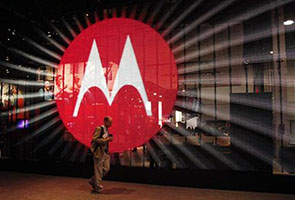- Home
- Mobiles
- Mobiles News
- Google to 'shrink Motorola operations' in India
Google to 'shrink Motorola operations' in India

The cuts are the first step in Google's plan to reinvent Motorola, which has fallen far behind its biggest competitors, Apple and Samsung, and to shore up its Android mobile business and expand beyond search and software into the manufacture of hardware.
The turnaround effort will also be a referendum on the management of Larry Page, Google's chief executive, whose boldest move has been the $12.5 billion acquisition.
Though Google bought Motorola partly because of its more than 17,000 patents, which can help defend against challenges to the Android operating system, it also planned to use Motorola to make its own, better smartphones and tablets.
One-third of the 4,000 jobs lost will be in the United States. The company plans to leave unprofitable markets, stop making low-end devices and focus on a few cellphones instead of dozens, said Dennis Woodside, Motorola's new chief executive, in a rare interview.
"We're excited about the smartphone business," said Mr. Woodside, who previously led Google's sales and operations for the Americas. "The Google business is built on a wired model, and as the world moves to a pretty much completely wireless model over time, it's really going to be important for Google to understand everything about the mobile consumer."
But some analysts wonder whether Google can succeed in the brutally competitive, low-margin cellphone business.
"Ninety percent of the profits in the smartphone space are going to Apple and Samsung, and everyone else from Motorola to RIM to LG to Nokia are picking up the scraps of that 10 percent," said Charlie Kindel, a former manager at Microsoft who writes about the mobile industry. "There's no real sign that's changing anytime soon."
It was not always this way. Motorola executives like to talk about its glory days. The company, started in 1928 in Chicago, unveiled the first commercial cellphone in 1973. By 2004, it looked as if Motorola could again lead the cellphone industry when it introduced the popular Razr.
But Apple and Samsung won consumers' hearts with the more exciting iPhone and Galaxy phones. Motorola Mobility - which split last year from Motorola Solutions, the division that makes devices like police radios - lost $233 million in its first six weeks under Google. The phone business has been unprofitable for 14 of the last 16 quarters.
"It got left in the dust by the competition and kind of missed the smartphone transition," said Charles S. Golvin, a mobile analyst at Forrester Research.
In addition to the coming cuts, Google has gutted Motorola management, letting go 40 percent of its vice presidents. It also hired new senior executives. It will shrink operations in Asia and India, and center research and development in Chicago, Sunnyvale and Beijing.
Mr. Woodside also plans to cut the number of devices Motorola makes from the 27 it introduced last year to just a few. He wants to make the company's products cool again by loading them with things like sensors that recognize who is in a room based on their voices, cameras that take crisper photos and batteries that last for days.
Many of these new ideas will come from a group of just a few dozen people within the company that has the unassuming name of Advanced Technology and Projects.
To foster innovation, Google created the group to drop a Silicon Valley-style start-up into a lumbering Midwestern company and recruited Regina Dugan from the Pentagon's Defense Advanced Research Projects Agency, or Darpa, to run it.
Ms. Dugan, though coming from Washington, already speaks the language of Silicon Valley. "It's a small, lean and agile group that is unafraid of failure," she said, and it will "celebrate impatience."
She is hiring metal scientists, acoustics engineers and artificial intelligence experts. They will work for her for only two years so they feel a sense of urgency, she said, an idea she borrowed from Darpa, where people wear their resignation date on their name tags.
Motorola has been spending too much money on too many different cellphone components, said Mark Randall, whom Google recruited to run Motorola's supply chain from Amazon.com, where he did that for the Kindle. He said he planned to jettison suppliers and buy 50 percent fewer components.
How to get people excited about Motorola phones when shiny iPhones are on the next shelf?
Gary Briggs, who ran consumer marketing at Google and now does so at Motorola, is working on advertisements that he said would be more like Google's - simple and emotional. They will focus on Motorola's storied past and the ways the products are better than the competition's, like battery life.
"We have a right to compete in this market," Mr. Briggs said, "and I think we've got to prove why we're going to build and bring devices to people that are worth talking about again."
Competitors like Sony, LG and HTC will be watching closely to see how the Motorola-Google relationship develops, especially whether Motorola receives special treatment from Google. Like Motorola, they use the Android mobile operating system, for which Google receives no payment.
"They certainly don't believe Google's going to keep a Chinese wall in place," Mr. Kindel, the former Microsoft manager, said of the other cellphone makers. "The reality is people work together, they can pick up the phones and talk. There is going to be an advantage."
There is, for instance, a program for Google software engineers to work at Motorola for a year or two.
But Mr. Woodside said Google benefited from many manufacturers' using Android, and repeated Google's promise that Motorola would have no advantages. He said Motorola would also compete equally with others to build Google-branded Nexus devices, which Google makes with a hardware partner when it introduces new versions of Android.
A Motorola Mobility executive who recently left the company and would speak only on the condition of anonymity because he was uncomfortable talking to the news media, said that if anything, it had become more difficult than before for Motorola to have impromptu collaboration with the Android team.
But still, because of the relationship, Motorola could get priority on Google products, like a mobile version of desktop software.
And, people familiar with the companies say, Google could decide to follow Apple's lead and build a phone from silicon to software, perhaps by creating a separate operating system for Motorola that other phone makers cannot use.
Google and Motorola seem to have a mutually beneficial marriage of hardware and software, Mr. Golvin said. Motorola needs software smarts and Google, which has struggled with Chrome laptops, Google TV and most recently the Nexus Q, needs help with hardware. Motorola's set-top boxes, which it sells to cable operators, could also help Google make the leap to TV screens, if it does not sell that business.
In the meantime, Motorola's cellphone expertise has already been useful. Sergey Brin, Google's co-founder, called to see whether the sky divers he had hired to perform at a recent conference could get cell reception a mile in the sky.
Copyright 2012 The New York Times Service
For details of the latest launches and news from Samsung, Xiaomi, Realme, OnePlus, Oppo and other companies at the Mobile World Congress in Barcelona, visit our MWC 2026 hub.
Related Stories
- Samsung Galaxy Unpacked 2026
- iPhone 17 Pro Max
- ChatGPT
- iOS 26
- Laptop Under 50000
- Smartwatch Under 10000
- Apple Vision Pro
- Oneplus 12
- OnePlus Nord CE 3 Lite 5G
- iPhone 13
- Xiaomi 14 Pro
- Oppo Find N3
- Tecno Spark Go (2023)
- Realme V30
- Best Phones Under 25000
- Samsung Galaxy S24 Series
- Cryptocurrency
- iQoo 12
- Samsung Galaxy S24 Ultra
- Giottus
- Samsung Galaxy Z Flip 5
- Apple 'Scary Fast'
- Housefull 5
- GoPro Hero 12 Black Review
- Invincible Season 2
- JioGlass
- HD Ready TV
- Latest Mobile Phones
- Compare Phones
- Apple iPhone 17e
- AI+ Pulse 2
- Motorola Razr Fold
- Honor Magic V6
- Leica Leitzphone
- Samsung Galaxy S26+
- Samsung Galaxy S26 Ultra
- Samsung Galaxy S26
- MacBook Pro 16-Inch (M5 Max, 2026)
- MacBook Pro 16-Inch (M5 Pro, 2026)
- Apple iPad Air 13-Inch (2026) Wi-Fi + Cellular
- Apple iPad Air 13-Inch (2026) Wi-Fi
- Huawei Watch GT Runner 2
- Amazfit Active 3 Premium
- Xiaomi QLED TV X Pro 75
- Haier H5E Series
- Asus ROG Ally
- Nintendo Switch Lite
- Haier 1.6 Ton 5 Star Inverter Split AC (HSU19G-MZAID5BN-INV)
- Haier 1.6 Ton 5 Star Inverter Split AC (HSU19G-MZAIM5BN-INV)
















